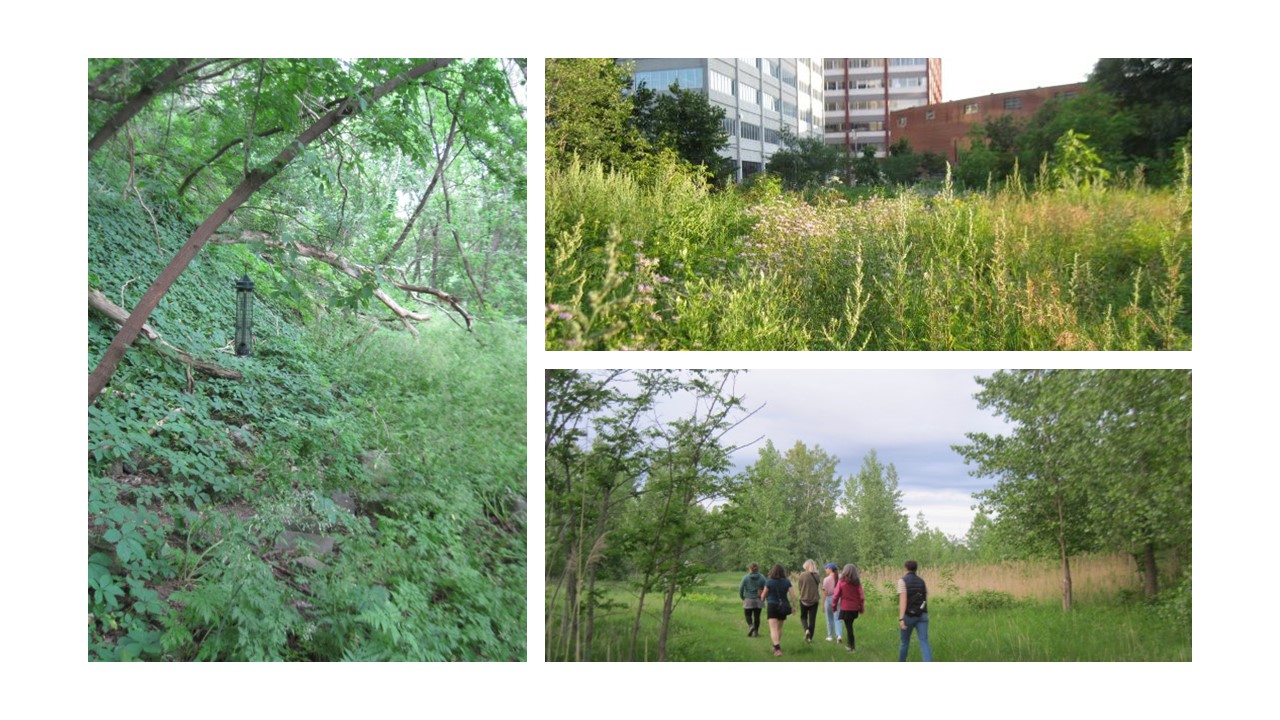POLI 349/A (Fall 2025): POL&SOCIAL THEORY & THE CITY
- Teacher: Joanne Downs
- Teacher: TINA RUPCIC
- Teaching Assistant: Lusakumunu Mbangi
POLI 349/A (Fall 2025): POL&SOCIAL THEORY & THE CITY
The study of public policy is concerned with politics and power, understanding how government decisions (and non-decisions) are made and how these decisions, in turn, shape social and political life. The question of who shapes policy and how is therefore critically important for students of public policy to analyze and debate. In this course, through a series of case studies, we will examine the role of advocacy groups in a range of campaigns with public policy implications at the provincial, federal and sometimes international levels. With an emphasis on the urban scale, we explore how groups take on collective projects and critically assess both the benefits and challenges advocacy groups bring to the policy process and to democratic life. Students are encouraged to pursue their own areas of policy interest through classroom discussions, additional readings, and written course work.
This course description is adapted from a syllabus designed by Prof. Frank Ohemeng. Some of his readings are included as optional, for those who would like to explore further.
At the end of the course, students are expected to:
· Identify and describe key concepts in the study of advocacy groups and public policy
· Understand something about how power works and how advocacy groups build counter-power.
· Appreciate how advocacy groups behave over time, and adjust strategies and tactics to changing circumstances
· Through the lens of case studies, know something about the strategies and tactics of advocacy groups, and be able to extrapolate how they attempt to shape public policy choices
· With an emphasis on the municipal level, learn something about Montreal groups and their history
· Develop skills in listening, reading, thinking, and assessment
· Communicate findings in written form
POLI 412/BB (Winter 2025): COMPARATIVE SOCIAL POLICY
POLI 429 (Winter 2025) - Political Socialization in Canadian and Comparative Perspectives
POLI 429/A (Fall 2025): POL SOCI IN CDN&COMP PERSPEC
POLI 683/A (Fall 2025): SPEC TOPICS IN P.P. & A.
Development Policy and Administration
This course provides an introduction to development policy and administration by focusing on a set of substantive issues. For purposes of this course, development policy and administration refer both to public policy and administration to promote various notions of social, economic, and administrative development, and to the development of policy and administration in low and middle-income countries.
This "edition" includes sections on development aid, the political economy of development, and climate change, including a session focused on energy transitions.

POLI 683/AA (Summer 2025): SPEC TOPICS IN P.P. & A.
This seminar explores social ecological and political economic issues related to informal urban spaces and strategies for conducting social research in these spaces. Informal green spaces that officials and investors often consider to be wastelands ripe for development are often treasured by urban residents. These spaces become entangled with their sense of place and community, offer respite from the heat and bustle of the city, and are perceived as providing habitat and refuges for biodiversity. Seminar sessions introduce participants to social ecological and political economic issues in informal urban spaces and strategies for conducting qualitative research in these settings. Lab sessions provide participants with practical experience with research techniques for studying these issues in three sites in Montreal: the Champ des Possibles in Mile End, the Falaise St. Jacques in NDG, and a complex of sites in Hochelaga (Boisé Vimont, Boisé Steinberg, and an area known simply as the friche, all near Parc Saint-Clément).
PSYC 325/02 (Fall 2025): FUNDS OF SOCIAL PSYCHOLOGY
PSYC 325/03 (Winter 2025): FUNDS OF SOCIAL PSYCHOLOGY

PSYC 325/04 (Winter 2025): FUNDAMENTALSS OF SOCIAL PSYCHOLOGY
This 3-credit course is intended to provide you with an overview of the main perspectives, theories, and research methodologies that typify social psychology. Social psychology is the scientific study of how people come to understand individuals, groups, and themselves as social entities. Social psychological processes influence how we perceive, evaluate, remember, and behave towards people. These processes shape, and are shaped by, our social expectations, social roles, social goals, and social interactions. Topics include impression formation, stereotyping and prejudice, and close relationships. As with any survey course, we will not cover every aspect of the field, nor will we be able to study any aspect in great depth. Rather, this course is intended to prepare you for more advanced study on topics in social psychology and related fields that are of interest to you.
PSYC 325/51 (Fall 2025): FUNDS OF SOCIAL PSYCHOLOGY
PSYC 425/03 (Winter 2025): CULTURE, DEVELOP & THE SELF
The official course description for LOYC 330 is as follows:
The objective of the course is for you to become familiar with the current theory and research on cultural variations in human development especially as they are related to the “self.”
PSYC 428/01 (Winter 2025): SOCIAL & CULT ADV ISSUES
PSYC 428/40 (Summer 2025): SOCIAL & CULT ADV ISSUES
Topic: Science literacy and writing in the age of misinformation

RELI 312/A (Winter 2025): JUSTICE & SOCIAL CONFLICT

RELI 312/A (Fall 2025): JUSTICE & SOCIAL CONFLICT
RELI 6007/A (Fall 2025): REGIONAL & INTERCULTURAL STUDIES: RELIGION AND POLITICS IN ASIA
Abstract
This seminar is designed to explore the relationships (historical, socio-cultural, economics, and others) between religion and politics. It consists in exploratory readings and discussions on different themes such as institutionalization, sponsorship, contestation, rulership, law, class, and others. The goal is to examine the various aspects of human endeavours and see how religion, beliefs, and religious practices shape and modify group and individual behaviors. What are the functions of religion in society? What are political power and religious power? What are their modus operandi? How does religion negotiate with politics? Which one of these dominates? How? When? And why? The class will consist in discussion of key readings together with students’ presentations on their own research, together with critical presentation of some readings and responses.
This particular course is designed to explore the two models of governance that dominate Asia since at least the turn of the first millennium.
Rationale
The objective of this course is to examine the Confucian model and the Indian Dharmasastra models that were exported respectively to Japan, Vietnam and Korea (China), and to Burma, Thailand, Cambodia (Kmer), and Indonesia from India. Our goal is to make the student familiar with the cultural background which provided the ideological and administrative basis supporting the creation of some pre-modern Asian polities. Many of these longstanding attitudes continue to be sustained with regard to ‘religion’ which does not recognizes the post-modern ways of Western paradigm and concepts. The relationship between state and supported religious institutions (such as state cults, Buddhism, and Indian Saivism for instance) versus religious movements that actively opposed established governments or other competing politically motivated religious groups (Catholic Christianity in China, Sunni Islam in Indonesia, Buddhist reactionary movements in Burma, and fundamentalist Hinduism in India). Although the areas covered is rather wide and diverse, this course will serve to further research based on different regions of Asia. Regions and time periods will vary according to the instructor’s speciality.
Format
This class is for upper undergraduates and graduate students. Therefore, it follows the seminar format where students will actively engage in research and critical appraisals of the readings, and in-class discussions. Each student will engage in research on one's field of inquiry (ex.: political ideology; religion and sponsorships; theology and political debates; divine right to rule; institutionalisation of religion; political models and ideological/theological/religious worldviews, etc.). During this class, students will complete set tasks relating to their research paper (ex.: topic; provisionary title; abstract; bibliography; methodology, etc.) and will participate in the discussions on the readings and in-class presentations. Participation is mandatory. No usage of AI is allowed in the writings of research papers, bibliographies, critical reports, and other assignments.

Social Debates and Issues in Public Affairs and Public Policy
This course examines the historical, political, and social dimensions of immigration policies in Quebec and Canada. It explores the evolution of immigration policy from pre-Confederation to contemporary times, highlighting the interplay of national and provincial interests, especially Quebec’s unique approach to immigration. The course addresses critical issues such as multiculturalism and integration models, the role public opinion in shaping immigration policies, and growing contemporary concerns over the capacity of Canada and Quebec to integrate newcomers, encouraging students to analyze the impacts of immigration on Canadian society.

This course focuses on understanding power, context and agency, engaging in critical social analysis and developing practical skills required in community organizing. The course explores popular education in community mobilization and collective action, and prepares students to run a successful strategic campaign, including identifying and analyzing targets, tactics, allies and potential opponents.
This course is designed to give students the opportunity to deepen their knowledge of social transformation strategies, and above all to equip themselves to apply them. Focusing on practice and popular education, the pedagogical approach enables students not only to acquire knowledge and skills, but also to equip themselves to pass them on to others in the field. A dynamic, interactive learning environment is created using the flipped classroom. This pedagogical model allows maximum classroom time to be devoted to exercises, discussions and projects.
Objectives:
« Discuss the oppositional approach to community organizing
« Explain power, interests, and balance of struggle
« Analyze a strategic campaign to obtain a demand based on an analysis of power dynamics
« Discuss popular education pedagogy
« Use the basic elements of Socratic dialogue to better understand the course material and practice sharing conversational space in a group.